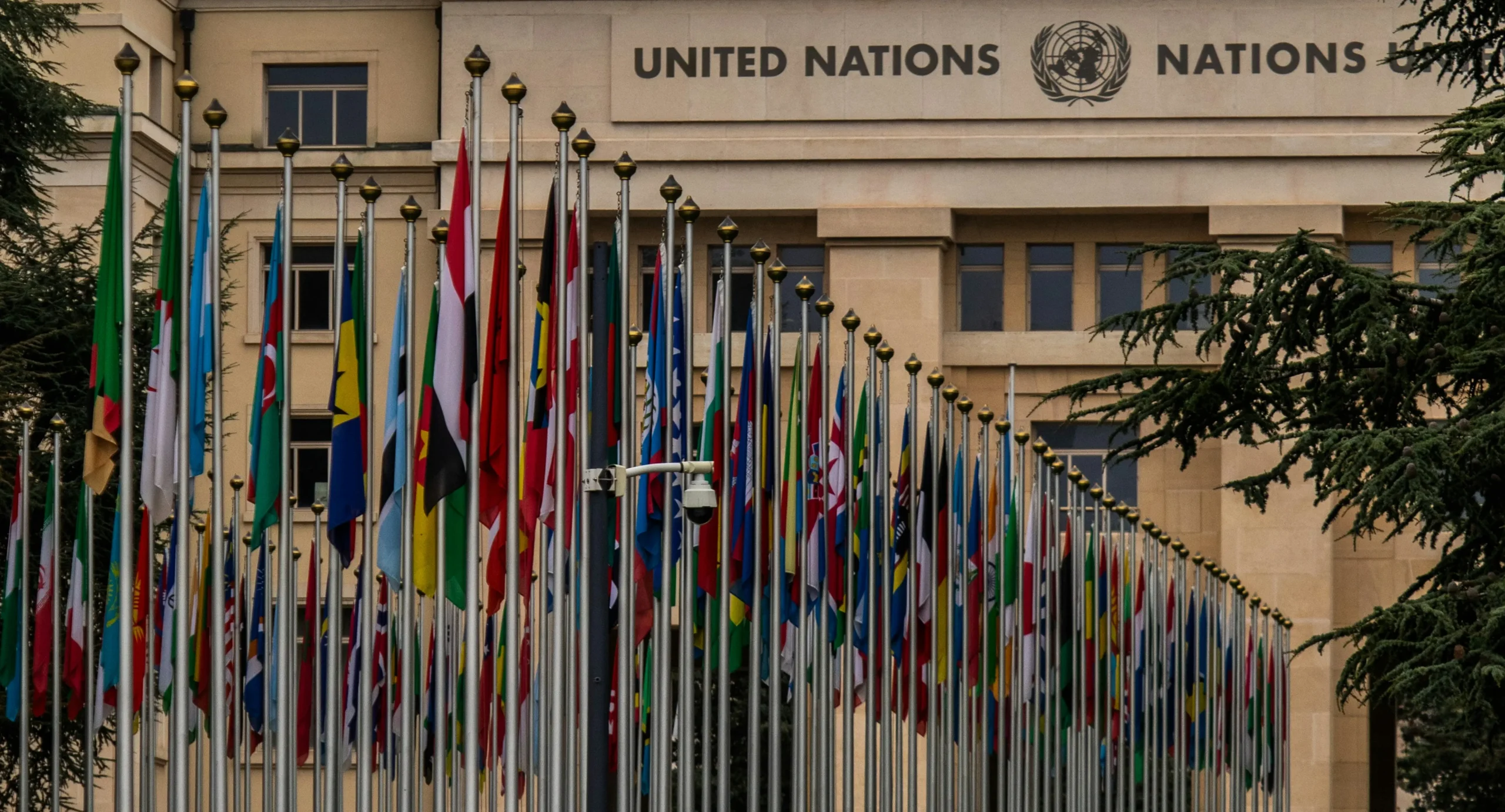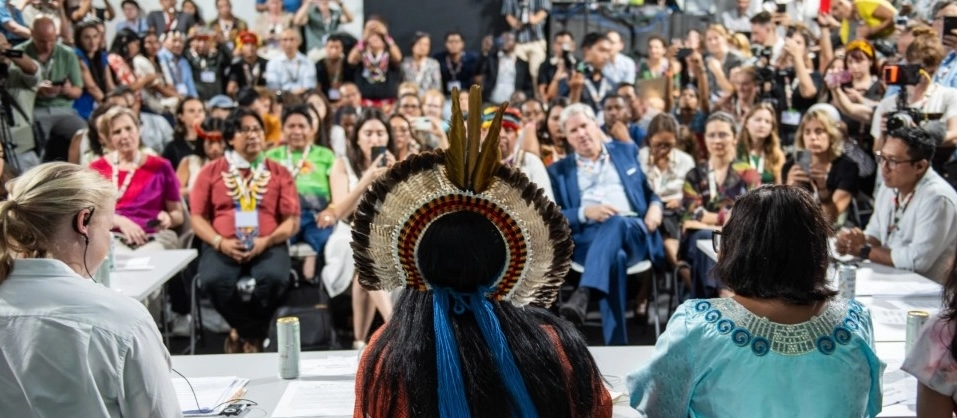COP30 in Brazil: storytelling strategies for climate leaders

In November 2025 ministers, policy makers, scientists, Indigenous leaders and youth activists will gather in Belém, Brazil for the UN’s 30th UN Climate Change Conference (UNFCCC), otherwise known as COP30.
Anchored in the ‘lungs of the earth’, the most important climate conference for global governance will be held for the first time on the edge of the Amazon rainforest, where communities have been historically marginalised in global decision making. But as communicators and storytellers, what does this mean for us?
At Greenhouse, we have supported clients at multiple UN climate, biodiversity and food system conferences. Here, we share the essential themes, policy moments and communication strategies to help you stand out at COP30.
“COP30 will be crucial in redefining the future of the planet and setting a solid benchmark that is equal to the climate challenge, ten years after the Paris Agreement.” – Marina Silva, Brazil’s Environment and Climate Minister
The key themes at COP30
The COP30 Presidency recently announced its thematic days, which serve as a useful marker when you can expect policy debates and media attention on those particular topics to peak. Aligning your announcements, commentary or content with these dates can boost their topicality and increase your chances of securing both coverage and engagement.
- 10-11 Nov: adaptation, cities, infrastructure, water, waste, local government, bioeconomy, circular economy and tourism
- Potential angles: Case studies on urban resilience, nature-positive tourism, circular economy solutions
- 12-13 Nov: health, jobs, education, culture, justice and human rights, information integrity and workers
- Potential angles: Linking climate policy to public health, worker protection and social justice
- 14-15 Nov: systems transformation across energy, industry, transport, trade, finance, carbon markets and non-CO₂ gases
- Potential angles: Announcements on clean energy investment, industrial decarbonisation, sustainable transport
- Potential angles: Announcements on clean energy investment, industrial decarbonisation, sustainable transport
- 17-18 Nov: planetary and community stewardship focusing on forests, oceans and biodiversity, while highlighting Indigenous peoples, local and traditional communities, children and young people, and small and medium-sized enterprises
- Potential angles: Amazon protection pledges, Indigenous governance models, youth climate entrepreneurship
- 19-20 Nov: Food, agriculture, equity, gender, African descent communities, science, technology and AI
- Potential angles: Innovation in sustainable agriculture, women-led climate solutions, AI for climate modelling
Top tip: Aligning with a relevant thematic day can make things easier for content planning and can help establish a hook for media if you’re announcing something new at the conference. But it can also mean that you end up competing with major thematic policy or government announcements on those days. You may want to consider launching ahead of the relevant day, to own the narrative, or saving your announcement and concentrating on newsjacking instead.
What has the Presidency outlined so far?
The COP30 Presidency has said they are dedicated to making this COP in Brazil one that is focused on solutions and delivery, by building on pledges from COP29 and setting the tone for the next decade.
“Our aim is to bring a new dynamic to global climate action by aligning the efforts of businesses, civil society and all levels of government in coordinated action. A global mutirão around achieving the Global Stocktake (GST) as a Global Nationally Determined Contributions (NDC), or rather a ‘GDC’ – the world’s globally determined contribution.” – André Corrêa do Lago, President of COP30
There are several changes, initiatives, roadmaps and financial commitments that the Presidency has already announced. Here are a few to have on your radar:
- Action Agenda: COP30 aims to move beyond negotiation to delivery through their six-axis Action Agenda to drive real-world progress across sectors by encouraging greater collective action.
- Tropical Forest Forever Facility: Brazil aims to launch a $125 billion blended-finance fund, the Tropical Forest Forever Facility, to reward tropical forest conservation, beginning in 2026.
- Climate finance scaling: COP29 set a goal to scale climate finance from $300 billion to $1.3 trillion per year by 2035. COP30 is expected to be a key moment in endorsing and operationalising this roadmap.
- Global NDC (GDC) proposal: Brazil is proposing establishing a “Global NDC” (GDC) that would aggregate climate commitments from companies, cities, states and other non-state actors as an effort to broaden both participation and ambition.
- Leadership Circles: COP30 will introduce cross-cutting Leadership Circles, including a “Circle of Presidents” (former COP leaders), to maintain momentum post-summit and steer discussions around finance, governance, Indigenous communities and global mobilisation.
- Global Ethical Stocktake (GES): Inspired by the Global Stocktake, the President of Brazil, Luiz Inácio Lula da Silva, and the United Nations Secretary-General, António Guterres, have launched a Global Ethical Stocktake (GES). While the Global Stocktake focuses on scientific and technical assessments of climate progress, the GES brings ethical, moral, cultural and philosophical perspectives into climate action.
Top tip: If you’re looking for media coverage during the conference, or to develop thought leadership content for your owned channels, look into these initiatives and announcements and consider whether you or your organisation have an interesting perspective to offer. Journalists are inundated with stories and often focus on the key policy announcements, sticking points in negotiations and expert commentary. At the same time, the media and climate community unable to attend COP are looking for timely and reactive updates from the ground.
Elevating underrepresented voices at COP30
Held in the Amazonian city of Belém, COP30 offers a rare and symbolic opportunity for communicators to centre Indigenous, local and frontline perspectives, highlight impactful solutions, and confront the deep inequities that underpin the climate crisis.
Local news outlets in the Amazon, such as Amazônia Vox, have been clear about the importance of giving space to local leaders, knowledge holders, and communities living on the frontlines of climate change.
“It’s kind of obvious, but all of our coverage will be based on listening to people here… our desire is to provide quality coverage, but mainly to show other journalists around the world all these voices that speak with a lot of knowledge, a lot of consistency, and that deserve to have more space,” said Daniel Nardin, executive director of Amazônia Vox, in an interview with LatAm Journalism Review
This approach matters because climate coverage and conversations can often be dominated by Global North voices and narratives, sidelining those who are on the frontline of climate change.
Top tip: To ensure your stories, announcements, social posts or communications materials centre the stories, priorities and wisdom of the Indigenous and local communities, you can:
- Partner with local journalists and outlets in Brazil who are committed to amplifying local stories and voices.
- Ensure informed consent and benefit-sharing when using local knowledge.
- Ensure language accessibility, translating key materials into Indigenous and regional languages.
- Advocate for global climate justice issues like loss and damage and underfunded adaptation needs, that affect those on the frontlines of this crisis.
- Challenge misinformation, particularly narratives that downplay Amazon deforestation or discredit Indigenous land rights.
Stay up to date with information on COP30
Subscribe to Greenhouse Morning News, providing you with the top environmental stories each morning.
If you are a journalist, join the Greenhouse media-only COP30 WhatsApp newsletter by emailing COP30@greenhouse.agency. This provides daily round-ups of key stories, expert spokespeople and commentary on negotiations across nature, food, ocean conservation, resilience, adaptation and Indigenous leadership.
If you require any support at COP30, it’s not too late to get in touch for more information.


